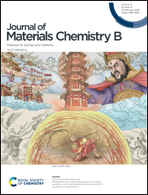Colon-targeted piperine–glycyrrhizic acid nanocrystals for ulcerative colitis synergetic therapy via macrophage polarization†
Abstract
Ulcerative colitis (UC) is a chronic inflammatory disease that affects the gastrointestinal tract and is characterized by immune dysregulation. Oral administration of nanoformulations containing immunomodulators is a desirable approach to treating UC. However, low drug-loading (<10%, typically), premature drug release, and systemic absorption of these nanoformulations continue to be significant challenges restricting clinical applications. Herein, we developed colon-targeted piperine–glycyrrhizic acid nanocrystals (ES100-PIP/GA NCs) to treat UC through the regulation of macrophages. The ES100-PIP/GA NCs exhibited ultra-high drug loading and colon-specific drug release. In vitro studies demonstrated that the ES100-PIP/GA NCs could effectively be internalized by lipopolysaccharide (LPS)-induced RAW 264.7 and Caco-2 cells. More importantly, the ES100-PIP/GA NCs could downregulate pro-inflammatory factors (IL-1β, IL-17A), upregulate anti-inflammatory factors (TGF-β1), and repair the intestinal mucosal barrier. In a murine model of acute colitis induced by dextran sodium sulfate (DSS), ES100-PIP/GA NCs could protect PIP and GA from gastric acid destruction, reach the colon, and significantly inhibit colitis. Surprisingly, ES100-PIP/GA NCs enhance M2 macrophages by increasing the mammalian target of rapamycin (mTOR), and inhibit M1 macrophages by reducing hypoxia-inducible factor-1α (HIF-1α). Overall, this study shows that ES100-PIP/GA NCs have synergistic immunotherapy capabilities with macrophage regulation, which offers a promising blueprint for the oral delivery of multicomponent drugs in UC therapy.



 Please wait while we load your content...
Please wait while we load your content...